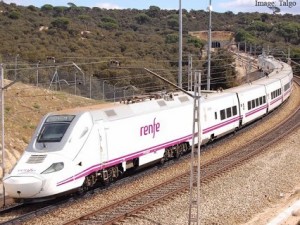
Spanish Talgo trains to speed up Mumbai-Delhi rail travel

India Prime Minister Narendra Modi, has given an in-principle go ahead for Madrid-based locomotive-maker to undertake trail runs of its lighter and faster trains that could cut the journey time from Mumbai to Delhi from 17 hours to 12 hours without changing India’s ageing rail tracks.
Talgo in July 2015, stated its intention to ship a train to India, at its own cost as a demonstration on the Mumbai-Delhi rail route.
Talgo trains are best known for their unconventional railway passenger car that uses a Talgo patent back in 1941, a type similar to Jacobs bogie. The wheels are mounted in pairs but not joined by an axle and the bogies are shared between coaches rather than underneath individual coaches. This allows a railway car to take a turn at higher speed with less swaying. As the coaches are not mounted directly onto wheel bogies, the coaches are easily insulated from track noise. Trains are also fitted with variable gauge axels can change rail gauge for instance at the 1668 mm broad gauge, 1435mm standard gauge. Since the introduction of the Talgo Pendular in 1980l the train tilts naturally inwards on curves allowing it to run faster on curves without causing
Spain’s high-speed tracks hosts a variety of trains, including the 220-mph AVE long-distance train, 155 mph Avant commuter trains and 155-mph Alva trains that changes gauges to operate on conventional net work. On type of train, the Talgo 730 can operate at 155-mph on electrified track and up to 90mph in diesel mode.
